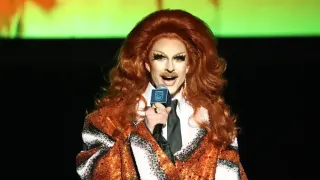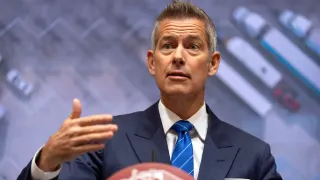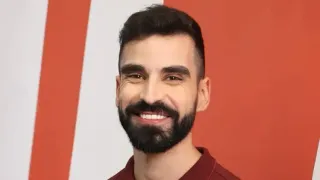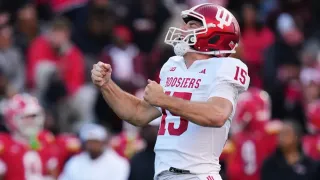April 15, 2024
Peripheral Visions: No Straight Lines
Kilian Melloy READ TIME: 18 MIN.
Peripheral Visions: They coalesce in the soft blur of darkest shadows and take shape in the corner of your eye. But you won't see them coming... until it's too late.
No Straight Lines
Henry Darrow frowned at the thin, flat surface of the scroll stretched across his desk.
He heard his partner enter the office they shared. "Why are you sitting in the dark? What is that?" DeGuerve asked him.
"Come have a look," Darrow said.
DeGuerve didn't bother switching on the overhead light. She leaned over his shoulder, peering down at the thin, flexible screen. Its blue glow shone on her face and gave her a strange complexion. "Is that Hindi?" she asked.
They both stared at the symbols on the screen. Each was a word comprised of two figures; as with all words written in Hindi, the distinct symbols were joined by a horizontal bar. The symbols looked as though they were hanging from a string. One word was made up what resembled a highly stylized, upside-down letter "H" next to what looked like a drawing of tangled string. The other word's two symbols looked, respectively, like an infinity sign with a small section missing, and a straight vertical line. The infinity sign was pierced by a straight vertical line of its own. The two symbols were not only joined by the horizontal bar, but also looked hooked together by a lopsided arc hovering over the horizontal line. The arc seemed to leap from one sigil to the other.
"Is this a clue?" DeGuerve asked, puzzling over the symbols.
"It's an answer," Darrow told her.
"To what?"
Darrow pushed his chair back slightly and leaned back. He looked haggard.
"Are you not sleeping well?" DeGuerve asked him.
"No, not really... not since our beloved tyrant, I mean president, I mean tyrant won his fourth so-called election. Not that it's hard to win when you've locked up everyone who's ever been a political opponent or shown a trace of opposition."
"That's not a joke you should be making within these walls," DeGuerve cautioned him. "They have ears, as I'm sure you know."
"Yes, when they choose to," Darrow said.
DeGuerve smiled at him. "If you're worried about me, don't be... I'm sure I'm going to be fine." The president's rhetoric against queer people like herself and Darrow had escalated sharply during the last election cycle. But DeGuerve had survived purges before; she had been clever in taking note of the obsession with the occult that the president and his closest advisors shared. She and Darrow specialized in cases that would appeal to their hunger for evidence of supernatural occurrences. It didn't hurt that DeGuerve had a flair, when writing up the reports of their investigations, for highlighting aspects of their cases that would play to the president's conviction that the universe was locked in a struggle between divinity and demons, darkness and light... and that he was the appointed guardian of God's will on Earth.
"I'm not so sure either of us will get through these strange days unscathed," Darrow sighed, and rubbed his eyes. "I've also been having strange dreams related to... well, to a case, I think."
"Which?"
"You remember that killing we investigated not long after I was reassigned to Homeland Security?"
"It's been eight years," DeGuerve said. The president had dissolved the FBI shortly after improbably regaining office for a second term. DeGuerve had pulled strings to get Darrow assigned to HomeSec, and pulled more strings to get him assigned as her partner. It was another smart movie on her part; Darrow had somehow ended up serving as point man for every monster sighting, seemingly impossible murder, and demonic visitation the FBI had investigated. He had a reputation that fit well with the one DeGuerve was burnishing for herself. "Which one do you mean?"
"The one we never solved," Darrow said.
"Oh?" DeGuerve leaned over the glowing blue screen again to take a closer look. "And this has something to do with our unsolved case, whichever that might be? Because I don't remember not solving a case."
"Yes, it's connected," Darrow said. "But not directly."
"Okay," DeGuerve said, crossing the room to her own desk and rolling the chair to where she could sit down facing him.
Darrow swiveled in his own chair and looked at her. "Three people murdered in three states, and no connection except that they were all related by blood – two of them first cousins, and the other one a second cousin. One of the first cousins, Danny DeMetrio, killed at his place of employment; the other, Anna Lise Meyer, killed in her home; and the second cousin, Gertrude Krotenberg, killed at the retirement community where she had recently relocated. Nothing else to tie them together except their link by blood. Krotenberg's immediate family had been estranged from the rest of the clan for decades."
"But we solved that," DeGuerve said. "In fact, we knew who the killer was as soon as we checked the office building's security videos. Emily Torres, age 53. Fingerprints and DNA matches from a few hairs recovered at the scene confirmed her identity. She was clever about evading capture, and she managed to kill the others before we got her."
"And you remember how we caught her? We looked at the family tree, figured out where everyone was, and then cross-referenced with a map," Darrow said. "She was making a beeline from one to the other depending on distance. She traveled forty miles to claim her first victim, then two hundred twelve miles to the second, and finally she went halfway across the country for the third. From there she only would have had to drive across town to her fourth victim... only, when she got there, we were waiting."
"None of that's a mystery," DeGuerve said. "She decided to kill people from the same family. So what? This isn't an unsolved case. It's closed."
"What's never been solved are the larger questions," Darrow said. "Motive, for instance. Why did Torres target the people she targeted?"
"She had a grudge," DeGuerve said.
"Why? What kind of grudge? What did they do to her?"
"Maybe nothing," DeGuerve said. "Okay, you're right, we never really pinned that down. She refused to speak, even at her trial."
"Right... and her defense lawyer argued that she was suffering from dementia," Darrow said. "She'd had a lot of health problems. But why that family? Torres had never had dealings with any of them. None of her victims were prominent people. The victims were linked by blood, but Torres had no link to the victims.
"But," Darrow continued, "I started going back over the records at the time, and I saw we had started looking at a few interesting possibilities that we didn't follow up on once Torres was arrested. For instance: I was going over a search you had made in the press archive to see if similar murders had been committed."
"Torres used an ice pick to kill each of her victims," DeGuerve said. "Shoved it through the foramen magnum – the opening at the base of the skull that connects the spinal cord to the brain."
"And she was a real pro at it, too," Darrow said. "She knew exactly how to hit the medulla – the part of the brain that controls respiration and heart action. She didn't just stab her victims, she swirled the ice pick around to shred the medulla, which resulted in instant death. Only, how did a 53-year-old woman with a third-grade education know how to do that?"
"She watched crime movies," DeGuerve said.
"Well, maybe," Darrow said. "But here's the thing: Among the results we got the from the archive search was a string of four murders that took place from thirty to thirty-eight years earlier than the killing spree Torres went on."
"So?" DeGuerve asked. "That's just white noise, meaningless detail the AI included."
"Was it?" Darrow asked. "I can't prove it, but I believe the killer in that case was a man named Daniel Fergusen. He used the same MO Emma Torres used later."
"How is that proof of anything? I'm sure lots of people have access to ice picks," DeGuerve said.
"And lots of people watch movies in which murder victims are killed by stealthy hit men who use pointy weapons to scramble their victims' brains," Darrow agreed. "I've seen a few of those movies myself. 'Goodfellas,' for one."
"You mean the one named after a kind of candy?"
"No, that's 'Looking for Mr. Goodbar'," Darrow corrected her. "Murder and mayhem, but very different storylines."
DeGuerve grinned at him. "You're the old movie buff. I'll take your word for it."
"Well, here's something else you can take my word for," Darrow said. "All four of the victims from those earlier killings were part of the same family. The authorities didn't see it at the time. There had been a messy divorce and parental kidnapping and other complications, but what the search we did showed in the Torres case was that two of the victims in the earlier killings were siblings. They hadn't seen each other in something like forty years. The other two victims were cousins to the siblings, and to each other."
"Those are similarities, yes, but..."
"I don't just mean those four earlier victims were related to each other," Darrow said. "They were also related to the three people Torres killed thirty years later."
"Okay... what?" DeGuerve asked, sounding shocked.
"Two clusters of victims, all related by blood – some of the relations not very evident," Darrow said. "Two clusters of murders separated by thirty years. One series of killings taking place across eight years – the other all within a week and a half."
"I'm getting confused," DeGuerve said.
"So was I... at first. But then I found something else." Darrow's face became even more grim, even more harrowed. "Both Emma Torres and Daniel Fergusen had received organ transplants."
Darrow paused, watching for DeGuerve to make a connection. She didn't seem to.
"Okay," Darrow said. "Let's go back to the first cluster of killings, the ones I think Fergusen committed. He killed his first victim forty-six years ago this month."
"Interesting anniversary," DeGuerve said.
Darrow nodded. "Maybe a coincidence; maybe not. But here's the thing: Fergusen spent half of his life in jail for stealing a car."
"That seems like a stiff sentence."
"He also led the police on a high-speed chase, caused a major made car crash on an interstate, killed three officers... shall I continue?"
"What the hell happened?" DeGuerve said.
"Police tried to pull him over for speeding," Darrow said. "What didn't make sense was that he had no warrants outstanding; he had no criminal record; he was the son of a very rich entrepreneur, had a good upbringing, went to good schools, was being groomed to take over the family business at the time of his arrest. An upstanding citizen, in other words, yet he was acting like a hardened criminal trying desperately to evade capture."
"And you have a theory about this," DeGuerve guessed.
"I have this interesting fact: At the time he was seen speeding, Fergusen was entering the city limits of Boise, where... guess what... I have confirmed just this morning that another member of the extended Krotenberg family was living with his wife and children."
"So, Ferguson was picking off people related by blood... and he happened to get arrested and put in jail before he could get to one of his intended victims."
"That's right," Darrow said. "Not that anyone knew any of that at the time."
"So why do you suspect Fergusen killed those people, the DeMetreos and the Krotenbergs?"
"Fergusen died in prison because his kidney failed – his donated kidney – six years after he'd received it... from this donor." Darrow reached down to the thin screen and swiped a couple of times, scrolling back through previous search results. He held up the scroll, showing DeGuerve an image of a middle-aged woman. "Reseda Gambrin. She died of a heart attack at age 63. She was a registered organ donor. This was right around the time federal restrictions on monetary exchange around organ donations were lifted... because, you know, rich people wanted to be able to buy more life, and the easiest way to do that was to deregulate organ transplantations."
"Sure," DeGuerve said, her eyes flickering toward the walls that, as she had pointed out earlier, had ears. Critiquing the Ownership class was almost as bad as critiquing the president.
"Reseda was twelve years old when her father, mother, and sister were all murdered by an eighteen-year old man named Darren Krotenberg who lived in the same building, basically a tenement in the workerstown quarter of Daysmith, Kentucky."
"Krotenberg?" DeGuerve said. "Now, that's got to be more than a coincidence."
"Wait until you hear the whole story," Darrow said. "It seems that Reseda's sister Consuela and this young man Darren had had some sort of fling. When Consuela wanted to break it off, Darren took it badly. He showed up at the family's door one suppertime with... you guessed it... an ice pick in his hand. Consuela's father was his first victim, then her sister, then her mother. Reseda saw the killings happen, but she escaped. Darren went on the run. He was arrested after a few days, and he spent twenty-four years in jail. While he was in jail, Darren found out that his other girlfriend had had a baby. Darren tried to correspond with his ex and their daughter for a few years, while he was in jail, but the girlfriend never responded. She married another man. Once Darren got out..."
"He killed her too?"
"No," Darrow said. "He never found her. Darren worked menial jobs in a state program until he died."
"Let me guess – in the environmental restoration program."
"The full name at the time was 'The Environmental and Spiritual Restoration Project.' It was run by a church that managed to get exclusive contracts with the government, which guaranteed the church a steady supply of workers being released from federal prisons. Working on the restoration project was a requirement of Darren's release from prison. If he's tried to quit, he would have been sent back in. But, like most of the workers, he only lived a few years."
DeGuerve nodded. "Not a surprise, since they were working at toxic waste sites, cleaning up spills, dealing with the aftermath of the meltdown at the Over Oak nuclear power plant in Virginia – also known as the American Chernobyl."
"Exactly," Darrow said "But here's the thing: That twelve-year-old girl, Reseda, swore revenge on Darren Krotenberg for killing her family. Not only that, she swore revenge on the entire Krotenberg line. After all, Darren had killed her whole family, and then his siblings and cousins acted in concert to hide him and get him to another town hundreds of miles away. Most of them were never convicted for lack of evidence, but..." Darrow shrugged. "It seemed pretty clear his whole family had his back."
"So, Reseda was going after Darren's daughter and her kids?"
"When I say she wanted to kill the entire family, I mean..."
"All of them," DeGuerve breathed, sounding like she had never heard of anything so heinous and deranged.
"Darren had two brothers and a sister, and they had kids of their own," Darrow said. "Then there were the cousins, and their kids. When Ferguson started killing, there were at least 141 direct descendants of Darren Krotenberg and his siblings and cousins. The four people we know were his victims all died by ice pick, but there were other deaths in the family that... who knows? Maybe he liked to mix it up a little here and there."
"So... Reseda was behind the first wave of killings?" DeGuerve guessed. "Did she pay this guy Fergusen? Or bribe him – maybe arrange for his to have her kidney?"
Darrow shrugged. "Maybe? She would have needed help, though. Someone in the medical establishment would have had to be involved. It's not outside the realm of possibility, I suppose. But then there was that second wave of killings."
"Torres took up where Fergusen left off," DeGuerve said.
"But why?" Darrow said. "And why such a long gap?"
DeGuerve looked at him expectantly.
"Yes, indeed," Darrow said, "there was a connection."
"You said they both had organ transplants," DeGuerve said.
"Torres received Fergusen's lungs. It was a big deal – a donation to a sick working-class teenager by a family whose reputation had been tainted by a wayward son. The Fergusens played up the 'generous gift of life' they were giving Torres, who was 16 at the time, and they even set up a medical expenses fund to prolong the usefulness of the transplanted lungs. Without treatment, the lungs would have failed in five or six years. But Torres was drawing breath with them until she died, in prison, four years ago."
DeGuerve nodded. Then: "Okay, but again, it's not clear why Torres would have agreed to start killing. Did the Fergusen family have a grudge against the Krotenbergs?"
"Why would they?" Darrow asked.
"I have no idea. But why else would two people with no connection to each other... aside from that they had both been beneficiaries of organ donations... target members of the same family across generations?"
"Cellular memory," Darrow said.
"What's that?"
"Come on, now, the name says it all."
"You mean a person's memories might be transmitted to another person thanks to an organ donation?"
"It's the only thing that makes sense," Darrow said.
"Does it?" DeGuerve asked skeptically.
"Reseda watches while Darren kills her family. She barely escapes with her life. It's a powerful, traumatic experience. It's branded into her brain... and into her body's other vital organs, at a cellular level. There's evidence for this, cases where murder victims' organs seemingly passed memories of the killing to the recipients of the donated organs. There was a famous case eighty or ninety years ago of a little girl who identified the killer of the man whose heart she received. She kept seeing the murder happen in her nightmares."
"Assuming this is medically possible," DeGuerve said, "it would account for Ferguson, but... why Torres?"
"If one person's memories can be passed to another person by way of a donated organ, then who says those memories can't imprint on all of the recipient's vital organs in turn? And why can't those memories propagate even further if that person's organs are donated in turn? If memory is a matter of protein sequences..."
"I don't think it's that simple," DeGuerve said.
"What if it is that simple?" Darrow asked. "Then we can draw lines from one crime to another to another."
"No straight lines," DeGuerve said, "and that makes the linkages you're theorizing suspect."
"Really?" Darrow asked her. "After we've chased down neo-Nazis that seemed to have a shared consciousness...after we've dealt with supernal entities punishing hatemongers for the lies they've told... and after we've looked into the bizarre deaths of people who were seemingly cursed by a little old man who attended their trials and shouted out the ways he hoped they would die, in the very ways they ended up dying... after all of that, you're going to tell me that traumatic memories can't be encoded in proteins that then find their way into new human bodies, fresh human minds? You're going to tell me an urge for revenge can't be transmitted like a virus? We finally have a theory that seems halfway grounded in physical reality and now you're skeptical?"
"I just don't know," DeGuerve told him.
"Is that why you overlooked so much in that first report" Darrow demanded, his tone accusatory. "Is that why you turned Danielson away when he came to you with a string of three killings he's linked together – including the assassination of a man accused of spying on our defense programs for India? A man no one should have been able to get to, because he was in protective custody... and yet, he died of poison? A man whose lineage links directly back to the Krotenbergs, just like the other two victims in Danielson's case file do?"
"Danielson never – "
"Stop it, Jillian," Darrow said, his face ashen, his voice strained. "Just – stop."
She stared at him.
"There's no such thing a privacy anymore, not even medical privacy," Darrow said. "It didn't take that much digging to find out that you're connected to this whole thing, too."
"Henry..."
"You were nineteen. You had blood cancer. You needed a transplant. Fergusen's marrow had been kept in cold storage for decades. There was so much controversy after his lungs were transplanted, after his family's attempt to appear magnanimous went south and they were accused of being showoffs, after there were demonstrations against rich people buying poor people's bodies for parts, or buying workers off with tissue donations. There was so much social division and rage back when the health care demonstrations were happening. But twenty years or so later, all of that is forgotten; the Fergusens have even forgotten that their son's marrow, like his corneas and his heart and his liver, have been donated and frozen. Someone decides to make use of that marrow to treat you. And then..."
"And then what?" DeGuerve asked him, in a challenging tone.
Darrow looked at her sadly. "You tell me. Nightmares? A growing sense of... of urgency?"
DeGuerve slumped in her chair and looked down at her hands. She suddenly seemed as exhausted as Darrow was.
"Not going to deny it any longer?" Darrow asked. "No more pretending to be surprised, no more befuddlement as I explain things you already know?"
"No," DeGuerve said.
"How many?" Darrow asked. "How many did you kill?"
"Six," DeGuerve said. "And killing that guy Roger Krotenberg, that spy... that felt good. My country might not be very kind to people like me lately, but I'm still a patriot. That traitor had to die... not get the cushy treatment for turning state's evidence, and not be used as a bargaining chip in exchanges of political prisoners. I enjoyed killing him; me. I did. It wasn't just Reseda."
"She's alive in you?" Darrow asked.
"In some way, I guess so," DeGuerve said. "I didn't know at first what I was seeing, what I was feeling... it was all mixed up, all muddled. But slowly, slowly things came into focus. I saw it, Henry. I saw the evil in that man..."
"In him, Jillian. Not his descendants."
"You believe memory can be passed from one person to the next, can be passed down through the generations? You believe that, but you can't see how evil... pure, murderous rage, and jealousy, and the will to annihilate others for the sake of your own satisfaction... you can't see that being passed down, too?"
"Isn't that what you were doing?" Darrow asked. "Annihilating others for your own satisfaction?"
"Doing what the doctors did when I needed that marrow," DeGuerve said. "Destroying cancer. Making way for something healthy."
Darrow shook his head. "Six," he said.
"All of them deserving," DeGuerve said. "You're right: I'm good at research, I'm good at uncovering connections. I could see how that generational evil was passed down through the family line. I looked into those people, their dirty deeds... I traced the financials, I combed through surveillance footage, I saw what they were doing. The drugs they dealt, the influence they peddled... I felt Reseda's rage, and I had to do something about it. But I, Jillian... I brought focus and purpose to the work."
"The 'work'," Darrow said. "Jillian... you sound just like a mission killer. You are a mission killer."
"Maybe so. Maybe that's what made me good at my job. And I thought... I thought you'd never catch on. You see patterns, but I thought I'd hidden everything away from you. I should have known that goddamn Danielson would circle back to you when I told him to fuck off."
"It wasn't just that," Darrow said. "I've been having nightmares. Dreams that I had a letter waiting for me but I couldn't open my email. Nightmares about lost passwords, power outages... nightmares for months. Ever since Roger Krotenberg's assassination – or rather, his wife's suicide."
"Anira?" DeGuerve said. "She was... I never meant for her to..."
"No, but she did," Darrow said.
"You think she was... I mean, you think her ghost was reaching out to you...?"
"I don't know," Darrow said. "But finally, in my dreams, I was able to access the message... and it was in Hindi. When I woke up, I remembered the symbols, the Hindi writing. I drew them. I looked them up... do you know what they mean? They're the words 'of war.' As in..."
"Daguerre," DeGuerve said. "My surname before I got rid of my deadname and changed my family name, too, to cut ties with people who hated me for being... for being who I was." Tears suddenly trickled down her face.
"The pieces to the puzzle must have been circulating in my subconscious all this time," Darrow told her, "because all of a sudden... it made sense. Things we didn't put together because you made sure of it. The killing of a spy that only a Homeland Security agent could have gotten to. I was hoping the theory would fall apart as I talked with you about it, that it would suddenly all seem ridiculous, that you'd point something out, something obvious that would make everything else make sense in some other way, but..."
"But all that happened," DeGuerve said, "was you found out part of what drove me all these years was a quest for revenge as well as a passion for justice. And not even my own revenge."
Darrow reached over, picked up the scroll, and snapped it shut. The office was dark; it was darker without the screen's blue light.
"So, what now?" DeGuerve asked.
Darrow tilted his head at one side of the room and then another. "The walls have ears," he told her.
Danielson was suddenly at the door with several other agents.
DeGuerve laughed bitterly. "Hoist on my own petard, is that it?"
"Come with us, please, Agent DeGuerve," Danielson said. He and the others looked grim... no, not just grim; crestfallen. DeGuerve had achieved the respect of her colleagues, and their admiration.
Some of them, Darrow knew, would respect her all the more now that her crimes had been revealed. And not even her own crimes, in a way... the crimes of someone else whose rage had infected her at the cellular level, the way the rage of demagogues had infected so much of the country at a spiritual level over the past few years.
"Darrow?" One of the agents had hung back as Danielson and the others took DeGuerve away.
Darrow waved the young agent away. He had things to do.
Without DeGuerve, he had little protection and few allies in HomeSec. He was a good investigator, but not the sort of charismatic people person DeGuerve had been. If Darrow had been respected, it was simply due to his proximity to her. Now she was in disgrace, what little social capital he had of his own would not be enough to shelter him.
The country was in an ugly place, and Darrow didn't see many promising avenues for the future. But he couldn't stay where he was.
It was time to go.
Next week we examine grief and its place in a world that makes no allowance for personal feelings. When Vin loses the love of his life, will he be swallowed into a wilderness of punishment for his emotional distress? Or will he find shelter in "The Grieving Room?"






